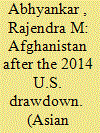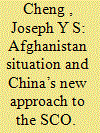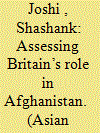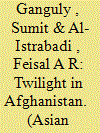| Srl | Item |
| 1 |
ID:
138738


|
|
|
|
|
| Summary/Abstract |
The U.S. decision to draw down its forces by December 2014 forced India to re-align its Afghanistan policy to assert its own interests. India’s on-the-ground exposure of US$2 billion and anticipation of the fallout from Pakistan-nurtured radical Islamic terrorist groups will guide the Modi government.
|
|
|
|
|
|
|
|
|
|
|
|
|
|
|
|
| 2 |
ID:
138737


|
|
|
|
|
| Summary/Abstract |
This article examines China’s concern to prevent terrorism and maintain stability in Central Asia through the SCO. The situation in Afghanistan has raised concerns among SCO member countries and strengthened common interests to maintain the regional organization, regime stability, and economic co-operation within it.
|
|
|
|
|
|
|
|
|
|
|
|
|
|
|
|
| 3 |
ID:
138740


|
|
|
|
|
| Summary/Abstract |
This article assesses Britain's contemporary relationship with Afghanistan, its goals and interests there, and its possible post-2014 role. It is argued that Britain might continue to play a limited but non-negligible military, intelligence, fiscal, and diplomatic role, even as British policymakers are increasingly bound by fiscal and domestic political constraints.
|
|
|
|
|
|
|
|
|
|
|
|
|
|
|
|
| 4 |
ID:
138736


|
|
|
|
|
| Summary/Abstract |
Since 2001, China has warily watched the U.S. military presence in Afghanistan and associated footprint in Central Asia. In 2014, Beijing grew alarmed that a U.S. exit would prompt a resurgence of violence and Islamic radicalism in Afghanistan that could spill over into neighboring states, including China.
|
|
|
|
|
|
|
|
|
|
|
|
|
|
|
|
| 5 |
ID:
138735


|
|
|
|
|
| Summary/Abstract |
Critics claim that lack of professionalism among Afghan provincial leaders undermines the government’s legitimacy, creating opportunities for the insurgency. Data on provincial governors show that those most effective at deterring insurgent attacks tend to have qualities associated with “warlords” rather than professionalism. Decentralization could harness these characteristics to improve governance.
|
|
|
|
|
|
|
|
|
|
|
|
|
|
|
|
| 6 |
ID:
138734


|
|
|
|
|
| Summary/Abstract |
U.N.-sanctioned interventions were imposed in Afghanistan to punish Taliban and al-Qaeda terrorists, establish effective government to prevent a Taliban resurgence, and enable U.S.-NATO troops to withdraw (except for a residual force to train Afghan security forces and conduct counterterrorist operations). The mission has failed: a ‘‘thugocracy’’ has been established. Will it be replaced by a Taliban theocracy?
|
|
|
|
|
|
|
|
|
|
|
|
|
|
|
|
| 7 |
ID:
138739


|
|
|
|
|
| Summary/Abstract |
The Russian government under Vladimir Putin has long-term geostrategic interests in Afghanistan: stability, economic development, and curbing narcotics flowing into Central Asia and thence to Russia. Moscow is in the difficult position of not wanting American forces to stay in Afghanistan but also not wanting the drawdown of forces to leave behind chaos.
|
|
|
|
|
|
|
|
|
|
|
|
|
|
|
|
| 8 |
ID:
138732


|
|
|
|
|
| Summary/Abstract |
AFTER CONSIDERABLE EXPENDITURE OF BOTH BLOOD AND TREASURE, the United States has now effectively withdrawn from Afghanistan. As of January 2015, over 2,200 U.S. servicemen and women have died in combat in that country, with more than 17,200 Afghan civilians dead. Further, according to a Pentagon estimate, the war has cost the U.S. $300 million a day. Support for the war in the U.S. has begun to wane in Congress, and the Obama administration does not seem overly concerned about declining congressional support. U.S. allies, who have steadily reduced their presence in the country, also show signs of growing fatigue with their involvement as domestic support for the presence of their troops in Afghanistan has dramatically tapered off.
|
|
|
|
|
|
|
|
|
|
|
|
|
|
|
|
| 9 |
ID:
138733


|
|
|
|
|
| Summary/Abstract |
The attacks of 9/11 spurred the U.S. to pursue national security interests in Afghanistan through expensive, overlapping strategies. The Afghan War helped elicit changes in the region that produced new American interests there. Because of a modern ‘‘Great Game’’ between regional and global actors in and around Afghanistan, the U.S. cannot afford to withdraw from the region.
|
|
|
|
|
|
|
|
|
|
|
|
|
|
|
|